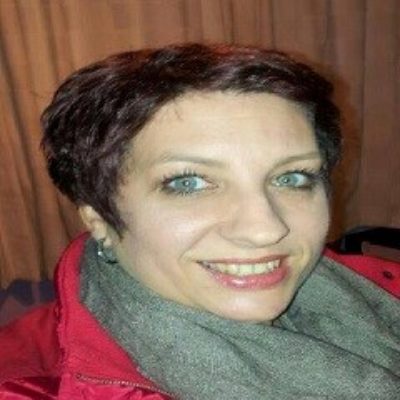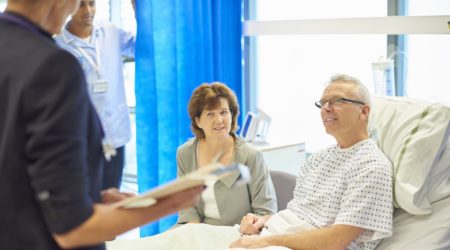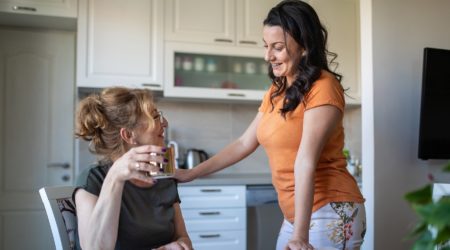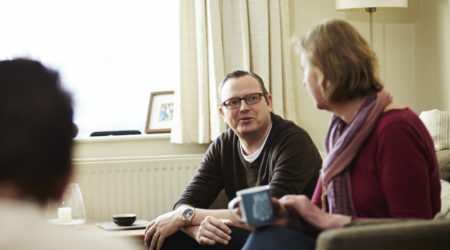

Julie
Julie was diagnosed in 2013 with a neuroendocrine tumour of the pancreas when she was 39.
I attended an emergency doctors one weekend with tummy and back pain (I had suffered from IBS for years but the pain was not the same as usual). Having examined me the doctor decided I may have gall-stones so he sent me for an ultrasound.
Referrals and scans
A few weeks later I attended the ultrasound on my gallbladder which was declared as healthy. However the sonographer had identified a lesion on my pancreas of around 2cm. He said he would write to my GP suggesting it required further examination.
A month or so later I attended a CT scan, the result came back that it was a tumour, well differentiated and I should be referred to a specialist centre for consultation. I had a referral to a few weeks later they carried out a biopsy which determined that I had a neuroendocrine tumour (NET) of just under 2cm in the body of my pancreas. Four weeks later I was advised it was malignant and I would be getting an appointment to go to the specialist centre to discuss my surgery options.
Surgery choices
I was given two choices, the first was the full Whipple’s operation. However at 38 they did not feel this was the right choice as it would guarantee that I was diabetic and that I would need to take enzymes every day, so they suggested the best option was to remove the body and tail of my pancreas and my spleen. The surgeon described it as a more difficult operation but felt it offered me best quality of life going forward.
I took some time to process it and struggled with the idea of loosing my spleen, it seemed such a major thing for such a small tumour. The consultant explained that some of the lymph nodes for the pancreas are close to the spleen and the safest way to ensure the operation was a success and remove all danger (a safe margin) at once. I agreed and was booked in for my operation 3 weeks later.
I had my operation on the 7th March 2013 – it took 8 ½ hours. Unfortunately I did manage to have every complication (including a significant bleed, leaking pancreatic fluid, and a very serious infection) they warned me about, but they did tell me that I was a rare case several times. I was expecting to be in 5-10 days but stayed in for 26 days in the end leaving with two drains, after a second operation and blood transfusion. I looked after the drains myself once I got home, they came out about 3 weeks later. Fortunately the operation was a success and there was no need for further treatment.
Recovering and returning to work
They told me my recovery would take between 6 and 12 months and warned me not to push myself too hard. I did everything that I was told to during my recovery and was able to start a phased return to work after 3 months, my consultant was really pleased I was recovering so well. I am still a little sore around the scars and do get tired easily but I found walking in my early time home from hospital helped me no end.
Luckily I’m not diabetic, my blood sugar levels are usually fine when they’re tested and with the exception of some bloating my digestive system seems to be working fine so I have not had to have any of the Creon that is sometimes necessary. Living without a spleen hasn’t been a problem, I have 500mg penicillin daily and emergency antibiotics to take if I feel an infection coming on, and as long as I start them as soon as my fever starts I’m fine.
I have been back at work full-time from November, determined to make every moment count. Since returning I have successfully negotiated a significant contract for our business and took the position of Managing Director on the 1st April 2014. I am finally spending quality time with family and friends again, planning fun days out family holidays!
Coming to terms with my cancer
Having been told by my consultant in May last year that had my tumour not been detected and successfully removed it would have been inoperable within 12 months leading to losing my life most certainly within 5 years it has made me appreciate the life I have and grab every opportunity to enjoy it.
I found accepting my cancer extremely difficult and particularly the lack of information and support (as pancreatic NETS are so rare, I was told very little other than ‘it’s fairly slow growing so we have time on our side’). I suffered from depression after my physical recovery was complete and sought help from Macmillan Cancer Support. A real turning point for me was attending a local HOPE course run by Macmillan from September through to November, I met some inspiring people who helped me come to terms with what had happened to me.
May 2014


